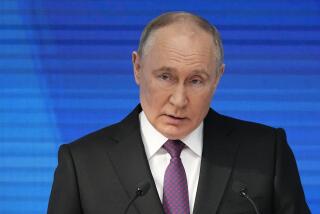Gorbachev Issues Stern Warning to Republics : <i> Perestroika</i> : The Soviet leader says refusal to respect federal law will not be tolerated and that the fate of his reform plans is at stake.
- Share via
MOSCOW — Soviet President Mikhail S. Gorbachev, increasingly concerned that his economic reforms will be undercut by the resistance of local officials, warned Monday that their refusal to respect federal law was making the country “uncontrollable” and that he would not put up with it any longer.
Gorbachev complained that local and republic governments, asserting their right to autonomy, are routinely ignoring the Soviet constitution and that businesses are violating contracts without any fear of punishment.
“We cannot tolerate this situation any longer,” Gorbachev declared, but he gave no indication of how he intended to enforce federal laws.
In his appeal, read on national television Monday night, Gorbachev warned that the fate of his political and economic reforms depend on discipline. “We shall not reach the goals we have set if we do not ensure the triumph of law,” he said.
Anatoly I. Lukyanov, chairman of the Supreme Soviet, the 542-member national legislature, also warned at the opening of that body’s fall session Monday that “without tough state authority, perestroika cannot succeed.”
The legislature is scheduled to begin discussing the government’s economic reform plan today, but by the end of Monday’s session, lawmakers had yet to receive a copy of the program, and it was not clear how Gorbachev would reconcile two rival proposals.
Despite the attempts by Gorbachev and Lukyanov to reassert the central government’s authority, challenges continued to grow.
Deputies called Monday for Prime Minister Nikolai I. Ryzhkov’s government to resign and for the Supreme Soviet to disband, saying both bodies had proven themselves ineffective.
In direct defiance of the Kremlin, the parliament of the Soviet Union’s biggest republic, the Russian Federation, continued discussing its own economic program and appeared likely to pass it today, officials said.
The Russian Federation’s program, based on a plan worked out under Gorbachev adviser Stanislav A. Shatalin, provides for a rapid transition from central planning to a market-driven economy through the selloff of state property, the abolition of government subsidies to businesses and a shift from controlled to free prices.
According to a document distributed to Russian deputies Monday and obtained by The Times, the Shatalin plan envisions basing the country’s economy--and to some extent, its political structure--on a voluntary economic agreement that would ensure a unified national market but leave most decision-making up to the Soviet Union’s 15 constituent republics.
Each republic would be allowed to give its own laws legal precedence over federal legislation on its territory, and republican governments would control all their natural resources. But the republics would unite to form common defense, financial and customs systems, as well as to organize transportation, communications, power supplies and major projects like the space program.
Shatalin has said that his plan is absolutely incompatible with the other main program Gorbachev has been considering--Ryzhkov’s proposal to make the transition to a freer economy much more slowly, allowing only limited private property and retaining more central control.
Lukyanov said that the government would present a “unified” program combining the two plans, but other officials said two key questions had yet to be decided: how quickly prices would be allowed to rise, and how much power Moscow was really ready to delegate to the republics.
Shatalin told reporters at the Supreme Soviet that, although he believed Gorbachev supported his program over the Ryzhkov proposal, he honestly did not know which would be the basis for the government report today.
“I’m not deceiving you--I really don’t know,” he said, shrugging.
More to Read
Sign up for Essential California
The most important California stories and recommendations in your inbox every morning.
You may occasionally receive promotional content from the Los Angeles Times.












